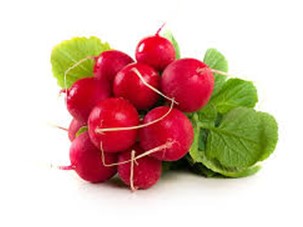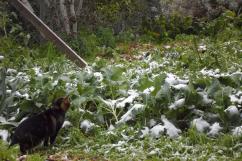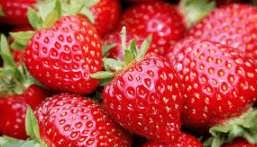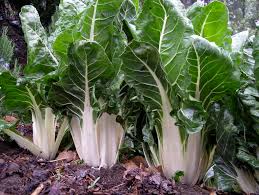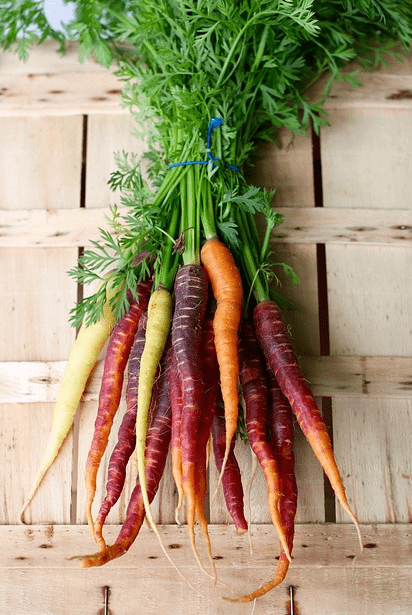The radishes that arrived at the store this week were so beautifully red and crispy that I immediately decided to write about them.
This decision was later reinforced by the rain that poured down (which makes me happy and makes me want to run around in the mud-filled garden but also to snuggle up inside and just write and rejoice with all the green leaves for the delightful arrival of winter) and also by the fact that the daikon arrived too, and it is beautiful.
Beautiful as only daikons in early winter can be. in general, this colorful and spicy family has been unjustly called “dry as radish”, at least in Hebrew, but there is nothing dry about a radish, on the contrary!
A radish makesany dish or salad happy (red, black, purple and even yellow radish – just choose!), and it refreshes any mouth.
Europeans are more accustomed to purple radishes, which are eaten raw and fresh or pickled.
The peoples of the East (Chinese, Japanese, Koreans…) are more familiar with the elongated and white version, and they too eat their radishes either raw or pickled, they also believe that eating radishes relieves an overloaded stomach after a meal. I'm not sure how much this natural remedy will help after a proper Seder dinner, but if you feel you have a few bites too many–why not try?
The radish is rich with vitamin C (as befits a vegetable that accompanies us during the winter) as well as potassium, calcium, phosphorus, magnesium and folic acid. It has been around for quite some time: the Greeks, the Romans, the Egyptians – all brought it to their table, and even the Roman emperor and our forefathers enjoyed its culinary and health benefits: “Antoninus and Rabbi Yehuda HaNasi, whose tables, due to their wealth, never lacked for lettuce, nor cucumbers, nor radish, neither in the summer nor in the rainy season”(Babylonian, Blessings 41).
Also oil was produced from the radish seeds, and in folk medicine the black radish is considered to strengthen the immune system, and when mixed with honey you get a great cough medicine (and very tasty, I must admit).
This is the recipe: remove the top of the black radish, and then dig with the tip of the knife to create a cavity in the white flesh of the radish, big enough to put a teaspoon of honey inside and still have some space left. Add the honey and place in a bowl overnight. Serve the resulting syrup in the morning to those who cough.
The radishes are loved not only in the Mediterranean region and in the east: in the town of Osaka in Mexico, the radish festival is celebrated every year on December 23rd (put it on your calendar), during which sculptures are carved out of tiny radishes as well as huge sculptures in what is called “Night of the Radishes”.
Not only the thick, reddish and plump root that grows underground is edible – but so are the leaves. They should be separated from the radishes as soon as you bring them home, to better maintain theircrispiness longer.
After removing the leaves, they do not need to be thrown away, they are edible – they are a bit prickly to the touch, so I turned them into a spread: I put them in the blender together with one lonely green pepper, without the seeds, a pinch of salt and a generous amount of olive oil.
If you prefer something simpler – try the English version of eating radishes: with salt and a little butter, or just chop it with a few celery stalks, season with lemon juice, salt, pepper and olive oil and enjoy every bite.
Yours.
The Garden’s team
Forecast:
In the ORGANIC vegetable baskets we expect (draft only):
Cucumber
Tomatoes
Lettuce
Potato
Eggplant
Kohlrabi
Swiss Chard
Parsley
The Large organic vegetable baskets also include:
Osaka Mustard
Pepper
Coriander
In the ORGANIC fruit baskets (NEW – Increased variety, price – 70 Shekels)
Oranges
Grapefruit
Banana
Clementine
Pomelo
The large ORGANIC fruit baskets also include: ( NEW – Increased variety, price -100 Shekels)
Lemon
Papaya
Red grapefruit
The ORGANIC Green Basket:
Swiis Chard
A kind of lettuce
Kale
Dill
Green onion
Sprouts
Spinach
NEW – The ORGANIC Basket for couples (price – 150 shekels):
Cucumber
Tomato
Lettuce
Potato
Eggplant
Pepper
Onion
Parsley
Swiss Chard
Beet
Sweet potatoe
Coriander
Beet
Oranges
Lemon
Sweetie

